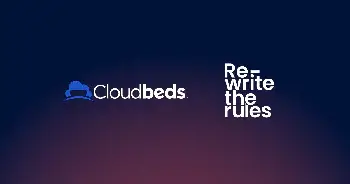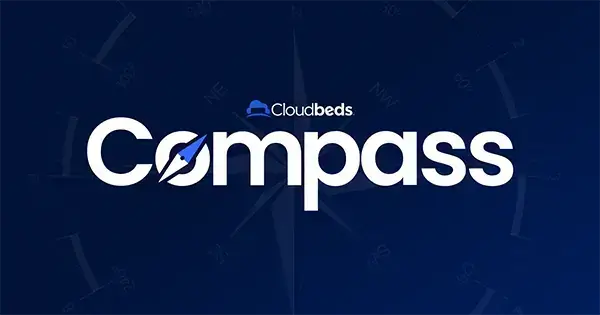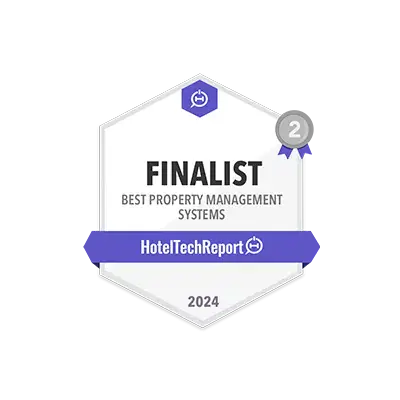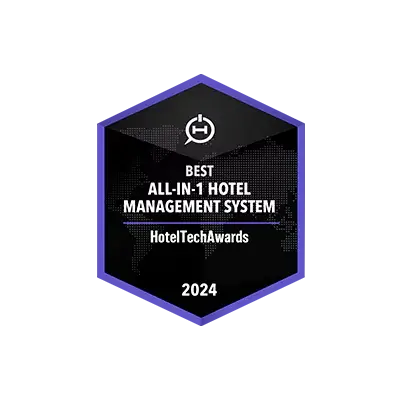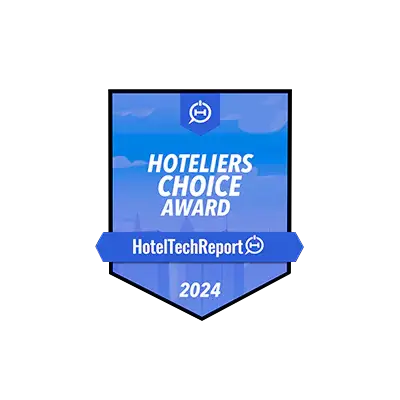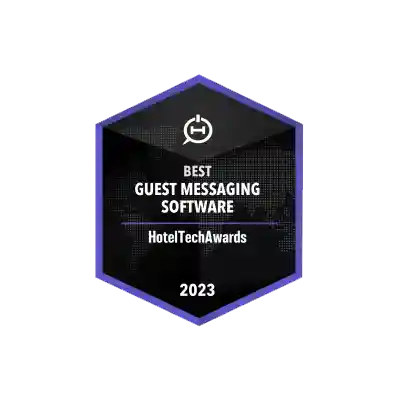
By Cloudbeds
Data analytics is the cornerstone of successful hotel operations. From understanding top-performing channels to finding new revenue opportunities to enhance the guest experience, data analytics touches every department.
Unfortunately, many hotels face data silos and are unable to piece together actionable insights. That’s where hotel software comes into play.
In this article, we explore the role of data analytics in the hotel industry, explain key terms, and showcase different ways to leverage data property-wide to improve performance.
Data analytics is the process of examining data sets to search for patterns, draw conclusions, support decision-making, and predict future market trends. For hotels, that involves collecting and analyzing data across various sources, including your hotel website, social media channels, online travel agencies (OTAs), surveys, and more. This data can then be used to make changes to improve revenue management, occupancy, guest experience, and operational efficiency. What is data analytics?
First vs. third-party data
Hospitality data can be broken out into first-party and third-party data. First-party data is all of the data you collect via your owned channels, like your website or upon check-in. Third-party data includes everything gathered from partner channels, including online travel agencies and social media.
Both are valuable and provide relevant information to help with marketing efforts, pricing decisions, customer experience enhancements, and more.
For data to be useful, however, hotels must leverage business intelligence software to gather and manage vast amounts of data across systems and put it together in a way that delivers actionable insights.
Benefits of data analytics in hospitality
Data analytics has all sorts of applications in the lodging industry. Here are just a few examples of how hotels can use data to improve performance:
- Understand changes to traveler preferences
- Optimization of channel performance
- Examine previous booking patterns to help increase future occupancy rates
- Compare pricing with competitors to develop an effective pricing strategy
- Analyze guest spending behavior to identify your most profitable segments
- Track labor costs per occupied room to identify optimal staffing levels that deliver increased customer satisfaction
Hotel analytics by department
In every department, you’ll find opportunities to leverage data analytics to improve performance. Here are just a few areas to focus on:
1. Guest experience
Multiple departments contribute to the guest experience, from the front desk and housekeeping to the hotel restaurant. By tracking real-time data from online reviews, accommodation operators can measure overall guest satisfaction and ratings by department.
Many properties supplement review data with customer data from post-stay surveys sent through guest messaging apps. Guest feedback data can be used to understand guest sentiment, identify trends and patterns, and prioritize the improvements that will bring the greatest benefits to guest satisfaction and loyalty. It can also be used as part of your marketing strategies to highlight the features guests love in hotel marketing campaigns.
Guest experience key performance indicators (KPIs). Examples of KPIs include average ratings in reviews and surveys, departmental ratings, and review or survey volume, as well as Tripadvisor rankings, and Net Promoter Score (NPS). Guest loyalty can be measured using metrics like stay frequency, average guest spend, and customer lifetime value (CLV).
2. Revenue management
Aside from accounting, revenue management may be the most data-heavy department in hotels. Revenue managers, leveraging artificial intelligence (AI) and machine learning (ML) combine external data like market demand and competitor activity with internal data like historical performance and future demand to guide dynamic pricing decisions, inventory controls, promotions, and demand forecasting.
Revenue management KPIs. Basic KPIs include average daily rate (ADR), occupancy (OCC), revenue per available room (RevPAR), and average length of stay (ALOS). Examples of advanced KPIs include revenue per available room (TrevPAR) and gross operating profit per available room (GOPPAR).
3. Marketing
Hotel marketing is another data-heavy department because it involves multiple channels, including the hotel website and search engine marketing, email marketing, and social media channels like LinkedIn. Each channel generates valuable data on conversion rates and return on investment (ROI) to determine how best to allocate resources.
Marketing KPIs. Examples of website metrics include monthly site visitors, page views, bounce rates, and conversions. Email marketing metrics include subscription rates, email open rates, and click-through rates. And social media metrics include followers and engagement.
4. Food & beverage
Hotel restaurants, bars, and room services tend to run on tight margins, so it’s important to keep a rein on expenditures. If costs climb without commensurate increases in hotel revenue, it can weigh heavily on the hotel’s balance sheet. Managers can analyze revenue data to find ways to increase guest spend through menu engineering, upselling, and promotions. It’s also important to analyze spending behavior to target guests with a high propensity to purchase F&B on property.
Food & beverage KPIs. Examples include average check, average table occupancy, labor costs of sales, food and beverage costs of sales, and revenue per available seat hour.
An important method for evaluating the success of a hotel’s strategies is to benchmark performance against competitors. For many properties, this means subscribing to STR’s monthly report. STR reports provide rate, occupancy, RevPAR, and market index data for a hotel’s competitive set, along with market averages and other valuable data points. The information helps property owners and operators visualize how they’re performing relative to competitors and identify opportunities to establish a competitive advantage, boost performance, and increase market share. Spotlight: What are STR reports?
What are the 4 types of data analytics?
Data analytics can be divided into four main types:
1. Descriptive analysis
Focuses on past data. It tries to answer the question, “What happened?” For example, a revenue manager may analyze historical occupancy rates to determine the high and low seasons to help guide pricing decisions and trends in guest behavior.
2. Diagnostic analysis
Examines data to find the cause of an outcome. It tries to answer the question, “Why did it happen?” A diagnostic analysis might be used if a hotel experiences a sudden drop in bookings. After digging into the problem, an owner may realize that the issue was a string of negative reviews that must be mitigated.
3. Predictive analytics
Focuses on the future, utilizing historical data to predict future outcomes. It tries to answer the question, “What is likely to happen in the future?” If there’s a yearly conference that comes to town, a revenue manager may look at past booking patterns to determine room rates for this year, while the housekeeping manager may reference past occupancy to optimize staffing for this year’s event.
4. Prescriptive analysis
Draws on data to make informed decisions. It tries to answer the question, “What should we do?” If a hotel sales leader wants to increase group occupancy, they may work with marketing to launch personalized marketing campaigns targeting specific corporate clients to drive bookings.
Which type of data analysis you perform will depend on your objectives and the type of data available to you.
Hotel data analytics software
Data is collected and stored across various hotel technology systems, including:
Property management system
Your PMS is the heart of hotel operations and should be the single source of truth for your data. It stores everything from guest profiles and payment details to room availability and rates.
Customer relationship management system (CRM)
Your CRM collects and stores important marketing and guest data, including contact information and preferences. It’s used to personalize marketing and communications and enhance the guest experience.
Revenue management system (RMS)
Your RMS collects and analyzes data related to pricing, occupancy rates, market demand, and compsets to help optimize pricing and maximize revenue.
Point-of-sale (POS) system
Your POS is used to collect data on guest purchases from the restaurant, bar, gift shop, or other ancillary services and provides valuable insights into guest preferences and payment methods.
Guest experience platform
Your guest experience platform gathers and stores data from guest surveys, upsells, reviews, and more to help you understand guest preferences and improve service.
Housekeeping system
Your housekeeping system tracks cleaning schedules, maintenance requests, and inventory management, helping you better forecast labor and restock supplies.
The role of business intelligence software
Since data is often spread across multiple systems, hoteliers must leverage business intelligence (BI) software to consolidate data for actionable insights. The right BI tool can help hotels:
- Visualize data to assess performance fast
- Analyze multi-property performance
- Improve collaboration across departments
- Implement strategies to enhance the guest experience and maximize revenue
Cloudbeds Insights: Unlocking data for hotels
Cloudbeds Insights is a hospitality-focused business intelligence solution that delivers real-time data to all members of a hotel, enabling teams to optimize performance. Built specifically for hotels, Cloudbeds Insights offers the following functionality:
- Customizable reports and dashboards with real-time data
- Deep integrations with the PMS for minimal latency
- Data visualization capabilities
- Hospitality-focused data structure
- Fully open APIs for additional integration capabilities
- Exportable formats (.json, .xlsx, and .csv)
- Multi-property reporting
Cloudbeds Insights unlocks data for hotels and allows users to easily aggregate, analyze, and share data across the organization (and beyond via automated workflows with ongoing subscription management).
The importance of data integration
With so many data sources to manage, hoteliers need solutions that provide seamless, secure connections to tools and applications in every department, centralizing and streamlining the collection, integration, storage, and usage of all types of data to make data-driven decisions.

